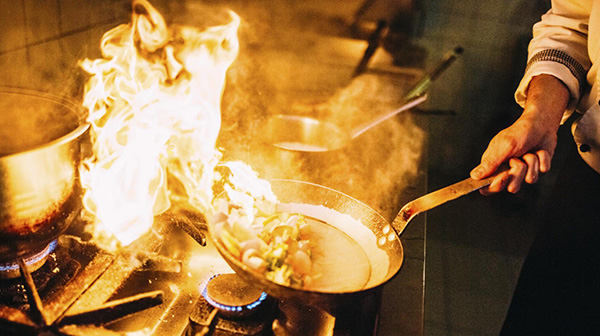Thank goodness that fires are covered in a standard Homeowners Insurance policy, right? Well, if you consider the fact that a Homeowners Insurance claim will only cover rebuilding your home, not its current value, you may decide to be a little more careful when it comes to fire safety during the holidays. Accidents and mishaps happen more often around this time of year, including fires in the home. We’ve made a list of the most common holiday disasters, along with a list of do’s and don’ts. We hope we can help you prevent a fire this year and wish you and your friends and family a happy and safe holiday. Make sure to share these important tips with everyone near and dear to you.
Kitchen Fire Safety
Novices and experienced cooks alike have experienced kitchen fires. And although a fire is a covered peril in a Homeowners Insurance policy, it’s best to prevent any fires in your home at all costs. If a grease fire does start, don’t panic. Just take proper steps to contain it, like turning the stove off, cutting off the fire’s oxygen and using your fire extinguisher. If the fire can’t be contained and continues to spread, make sure to evacuate everyone from the house and call 911 from a safe distance. Tips on preventing such fire accidents from happening are below:
Do’s
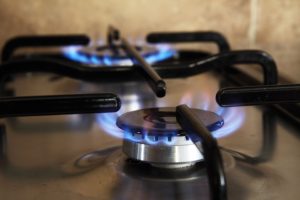 Make sure your smoke detectors are working. Your smoke detector can be the difference between a small fire that you can easily put out, and a raging fire resulting in permanent home damages. You want to be alerted as soon as there’s smoke.
Make sure your smoke detectors are working. Your smoke detector can be the difference between a small fire that you can easily put out, and a raging fire resulting in permanent home damages. You want to be alerted as soon as there’s smoke.- Make sure your oven is clean of food particles that may catch fire before you preheat the oven.
- If you’re deep frying, take your turkey outside. Do your deep frying on a flat, level surface that is not too close to your home (at least 10 feet away).
- If there’s a kitchen fire, turn off the stove, microwave or oven. Remember that cutting off oxygen is the best way to suffocate a fire. Close the oven door if something’s burning or cover the stove-top fire with a lid if possible – but only if the lid is not hot.
- Make sure you have a fire extinguisher in your home, preferably in the kitchen. If there’s a grease fire that won’t go out, use the fire extinguisher. If you never thought to have a fire extinguisher in your home, you should consider one. And if you’ve had an extinguisher for a long time, make sure it’s not expired. While one fire extinguisher cannot contain a fire that has spread, it is handy to keep in the kitchen in case of a small grease fire, the culprit of most kitchen fires. Remember to always activate the extinguisher from a safe distance.
- Make sure that you not only have Homeowners Insurance, but that you also have sufficient limits. Fire is always included in a standard Homeowners Insurance policy. However, if you have built additions to your home or made expensive renovations or purchases, you may not be covered for the improvements without proof.
Don’ts
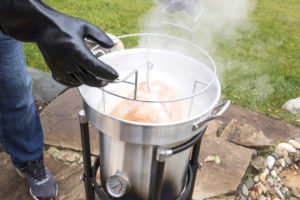 Don’t leave food in the oven or on the stove-top unattended. No, not even while you have something simmering.
Don’t leave food in the oven or on the stove-top unattended. No, not even while you have something simmering.- Don’t leave ovens and stoves unattended for more than a few minutes at a time. A fire can escalate very quickly and without much warning. A fire may be burning and spreading for quite some time before you smell smoke.
- Don’t try to douse a grease fire with water. It will cause oil to spray and flames to spread to other surfaces.
Candles
Votive candles, decorative candles and candles scented like vanilla and Cinnamon – we all love lighting them all during the holidays. But candles can be dangerous when left unattended. It only takes one person to knock over a lighted candle and start a fire. And it only takes one incident to cause your insurance premium to go up. Remember, the fewer claims on your Homeowners Insurance policy, the less you pay for coverage.
Do’s
- Always leave adequate space between a candle and anything that can burn. Avoid placing your candles by newspaper and magazines, books, plants, curtains, etc.
- Consider using flameless LED candles, which are much safer, especially if there are children and pets around.
- Keep an eye on any candles that are burning. Never leave the room for more than couple of minutes.
Don’ts
- Never use real candles as ornaments on trees, wreathes and other decorations. The last thing you want is your beloved tree catching on fire right before Christmas.
- Don’t leave candles lit in an unattended room. Make it a habit to blow them out when exiting a room.
- Don’t leave candles burning overnight while you’re asleep. Always blow them out before going to bed.
Christmas Trees
Oh, Christmas tree… Oh, Christmas tree… A great source of joy and beauty during the holidays is the Christmas tree in your home. It’s a common holiday tradition in which families come together to decorate their tree. This year, don’t let the tradition be ruined with faulty string lights or flammable ornaments. Your Homeowners Insurance may cover you in case of a fire in your home, but no one wants to make a claim right before Christmas.
Don’ts
- There are very few things as flammable as a dry Christmas tree, so you never want to leave one near any outlets, plugs or flames.
- Lighting or string lights with frayed wiring or broken sockets can be enough to turn your tree into a fireball faster than it takes to call the fire department. Avoid using electrical decorations/lights and get more creative with your ornaments.
Do’s
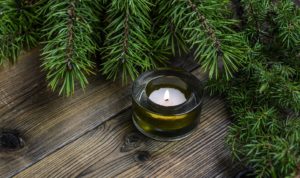 Buy a fresh tree that is too hydrated to catch fire. Ideally, you’ll water it every day to keep it fresh and impossible to ignite. After a month, it will be a dry tree, no matter how much water you give it, so take down the decorations and throw the tree away.
Buy a fresh tree that is too hydrated to catch fire. Ideally, you’ll water it every day to keep it fresh and impossible to ignite. After a month, it will be a dry tree, no matter how much water you give it, so take down the decorations and throw the tree away.- If you buy an artificial tree, make sure it is flame-retardant. Even still, avoid using electrical ornaments and choose LED string lights over other types.
- Always turn off electrical decorations and string lights before leaving your home or going to sleep.
Outdoor Decorative Lights
We all love driving by a house with a spectacular Christmas light display. In fact, Christmas light displays become more competitive each year as neighbors try to out-do one another. While we want to encourage your holiday spirit, we also want to make sure you’re being safe. There are many ways you can have the best Christmas light display while still ensuring your fixtures, plugs and wires are safe first. You don’t want to have to make a Homeowners Insurance claim because of junky string light wiring.
Do’s
- Inspect all the string lights you plan to hang outside. Make sure there are no frayed wires or cracked/broken sockets.
- Only use extension cords and decorations meant for outdoor use. If they’re made to be outdoors, that means water shouldn’t cause any short-circuiting.
- Make sure you only buy decorations that you can power electrically. Match the power needed by your electrical decorations with the amperage rating of your extension cords. Otherwise, they can overheat and cause a fire.
- Turn off electrical decorations before leaving home or going to sleep.
Don’ts
- Don’t string more than three strings of lights together, and make sure extension cords are working properly and are not damaged.
- Don’t leave lights hanging outside all-year round. Take them down within a couple of months after the holidays to prevent damage from the elements and wildlife. It only takes one small problem in the wiring to create a spark that leads to a fire.
Fireplaces
A great place for family and friends to gather is around the fireplace. During the holidays, it’s a great feeling to snuggle next to a warm fireplace with a mug full of hot cocoa. However, like any fire in your home, a lit fireplace can be very dangerous.
Do’s
- Have your chimney walls cleaned out before using your fireplace for its first use of the year. Soot hardens and can prevent proper ventilation. It also turns into a flammable substance.
- Install a screen to the fireplace if you don’t already have one. Not only will the screen prevent flying embers from catching fire on the floor or carpeting, it’ll also keep pets and children away. However, pets and children still need to be supervised near a working fire.
Don’ts
- Never throw paper or scraps in the fire. Only burn wood that is specified for use in a fireplace (seasoned wood).
- Don’t throw the embers from the fireplace outside or in the trash. They need to cool for 24 hours to no longer be flammable.
- Don’t leave pets and children unattended near a fire.
Electrical Fires
Electrical fires happen year-round, but become even more common around the holidays. There are several signs of an electrical fire that you should watch out for. If your circuit breaker keeps tripping or if there’s a lingering smell of smoke without an obvious source, you should have the electrical system in your home checked out. A burnt smell may be coming from a short circuit. According to the U.S. Consumer Product Safety Commission, short circuits are the number one cause of electrical fires. You shouldn’t keep resetting the breaker because it may overheat and cause a fire. If it keeps tripping you may be at risk for an electrical fire. The older your home is, the more prone it is to one. It’s always best to consult an electrician if you have recurring problems with a circuit breaker, see discoloration near outlets and switches, or if the burnt smells persist.
Do’s
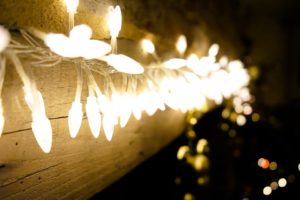 Check your electrical outlets and make sure any holiday lighting you’re using is frayed or damaged at the connection. Loose terminals or crushed cables are fire hazards. Faulty cords can start a fire when they come into connection with rugs, curtains, floors and other flammable objects. The source of an electrical fire can also be a faulty appliance.
Check your electrical outlets and make sure any holiday lighting you’re using is frayed or damaged at the connection. Loose terminals or crushed cables are fire hazards. Faulty cords can start a fire when they come into connection with rugs, curtains, floors and other flammable objects. The source of an electrical fire can also be a faulty appliance.- Check for problems in the wiring of your house. If you live in an older home, make sure to learn what the maximum amount of electricity is that your wiring can take. Otherwise, you’re at risk for a fire.
- Check your circuit breaker boxes. Old connectors can easily start electrical fires with an overload of electricity. Make sure to have them replaced, especially if you live in an older home and the connectors look worn.
- If your home is more than 50 years old and has never had the wiring updated, your house is a major fire risk. An older home’s electrical system cannot handle the electrical load needed for today’s home appliances. You need to hire an electrician to rewire your entire home.
Don’ts
- Do not attempt to control or put out a house fire yourself. It’s the job of an expert to figure out what the exact source of an electrical fire is. Get yourself and everyone else, including pets, out of the home immediately. Call 911 as soon as you are a safe distance away from the fire.
- Don’t remove the grounding plug from a cord to use it in a two-prong electrical outlet. Only outlets that can handle the amount of electricity the appliance requires have three prongs. Don’t try to trick the outlet or you could start a fire.
- We rarely think of bulbs as safety hazards, aside from scenarios of draping fabric or paper over the bulb. However, there is also a maximum recommended bulb-wattage on most lighting fixtures and lamps. Follow them!
- Heating appliances and lights are the usual suspects for electrical fires. Don’t leave space heaters close to anything that may catch fire from the heat. The coiled space heaters tend to be more dangerous than the kind that radiates heat from a surface.
- Don’t become overly reliant on extension cords. They often cause sparks that catch fire, especially when they are overloaded.
Homeowners Insurance
All in all, there are many ways a fire can accidentally be started in your home this holiday season. It’s best to be as cautious as possible and follow our tips to help avoid a Homeowners Insurance claim. If you have questions regarding Homeowners Insurance or the limits you should have on your policy for fire protection, call an AIS Insurance Specialist at (855) 919-4247.
The information in this article was obtained from various sources. This content is offered for educational purposes only and does not represent contractual agreements, nor is it intended to replace manuals or instructions provided by the manufacturer or the advice of a qualified professional. The definitions, terms and coverage in a given policy may be different than those suggested here and such policy will be governed by the language contained therein. No warranty or appropriateness for a specific purpose is expressed or implied.
